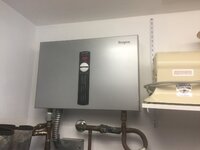I’m remodeling my bathroom and I’m considering upgrading to a tankless water heater at the same time.
I live in southwest Montana and have a bath/shower and 2 sinks that will draw from the heater.
Some of the things that I’m wondering about are brand, output/size of the heater, wiring it in (which will probably be the hardest part for me), and any issues that you may have encountered if you’ve done this before.
My place is pretty old and I’ve been upgrading as I get the cash to do so. As it sits most of the house is wired for single phase electric and it seems that most heaters are dual phase. Is this a tough obstacle to overcome? I was also wondering about 220 vs 110.
Electrical is not my strong suit so any advice on that front is greatly appreciated.
Thanks everyone.
I live in southwest Montana and have a bath/shower and 2 sinks that will draw from the heater.
Some of the things that I’m wondering about are brand, output/size of the heater, wiring it in (which will probably be the hardest part for me), and any issues that you may have encountered if you’ve done this before.
My place is pretty old and I’ve been upgrading as I get the cash to do so. As it sits most of the house is wired for single phase electric and it seems that most heaters are dual phase. Is this a tough obstacle to overcome? I was also wondering about 220 vs 110.
Electrical is not my strong suit so any advice on that front is greatly appreciated.
Thanks everyone.


